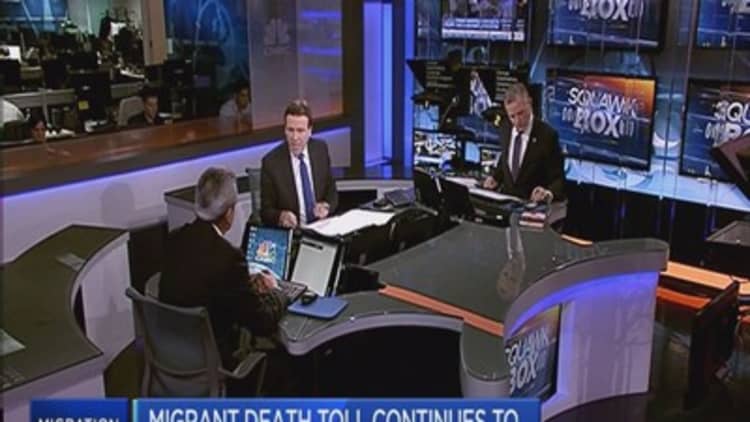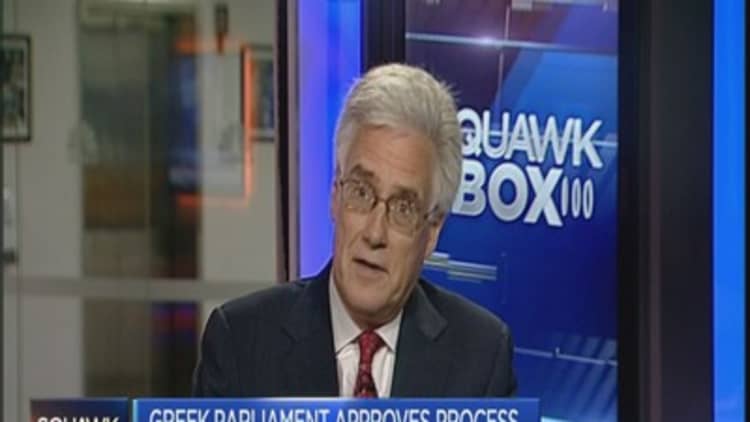





As record numbers of migrants and refugee reach the shores of southern and eastern Europe, there are concerns that the refugee crisis is hitting Greece's lucrative tourism sector.
A total of 218,394 migrants made the dangerous trip across the Mediterranean Sea to Europe last month — not far off the 219,000 that arrived during the entirety of 2014, the United Nations High Commissioner for Refugees (UNHCR) said on Monday.
The vast majority of migrants (or 96 percent) crossing the Mediterranean in October landed in Greece — all but around 8,000, the refugee agency said.
Twitter: Greece migrant numbers
Greece's Aegean Islands to the east of the mainland have felt the brunt of much of the influx, with the island of Lesbos most affected. These islands and the coast of mainland Greece are lined with tourist resorts, leading to concerns about the impact on one of the country's most important industries.
"The impact on the economy of the islands is very big...Most of these islands live from tourism, so there is a fear that tourism will go lower because of the immigrants that flowing into the islands," George Xatzimarkos, governor of Greece's Southern Aegean Islands, told CNBC on Monday.
Tourism accounts for about 20 percent of Greece's total gross domestic product, according to Elena Kountoura, the country's alternate minister of tourism for Greece. She said tourism numbers had grown this year, despite migrant inflows and the troubles earlier this summer as the country grappled with a debt crisis and impending bailout.
Kountoura said that while 22 million tourists visited Greece in 2014, projections showed 25 million tourism arrivals for 2015 — which would set a national record.
"We give priority to human rights, and the tourists as well, so we didn't have impact so far. We're very proud to say that all our tourists behave really great and they support these people that left their countries and... are trying to survive," Kountoura told CNBC on Monday.
"it's not a Greek problem...It's a European and global problem, so we have to find a solution for these people… because they're not numbers. They're souls, they're humans," she added.
Xatzimarkos also called for a wider European response, saying Greece does not have the resources to deal with the crisis on its borders alone.
"It's huge. It's the biggest crisis that Europe has faced on the migration issue," he told CNBC.
European officials should have dealt with the first signs of the migrant crisis two years ago, he added. Now, authorities should help finance refugee camps in the Middle East, particularly those in countries like Jordan, which share a border with war-torn Syria, he said.
Many of the migrants and refugees coming to Europe are fleeing violence in countries across the North Africa and the Middle East, including Syria which is grappling with a years-long civil war.
Just over half of all Mediterranean sea arrivals are from Syria, with 18 percent coming from Afghanistan and 6 percent from Iraq, according to the UNHCR.
"(Europe should) finance the camps, because if the camps go down, 5 more million people will...try find a way to go to Europe," Xatzimarkos said.
He added that dealing with the crisis was a matter of foreign policy, not just money.
"If we say that this is only a budget issue and that the problem is only financing it, we will underestimate it. It's very big…It's a matter of cohesion. It's a matter of having …(a) foreign policy as Europe."
The UNHCR could not be contacted by press time.
At least 15 people died, several of them children, on Thursday, as strong winds hit smuggler boats carrying refugees and migrants across the channel between Turkey and the Greek islands.

